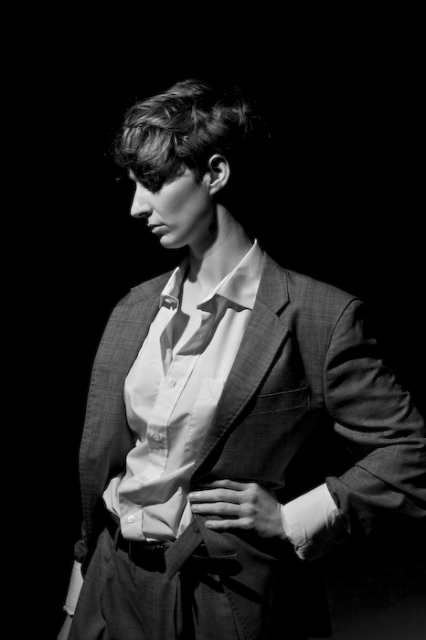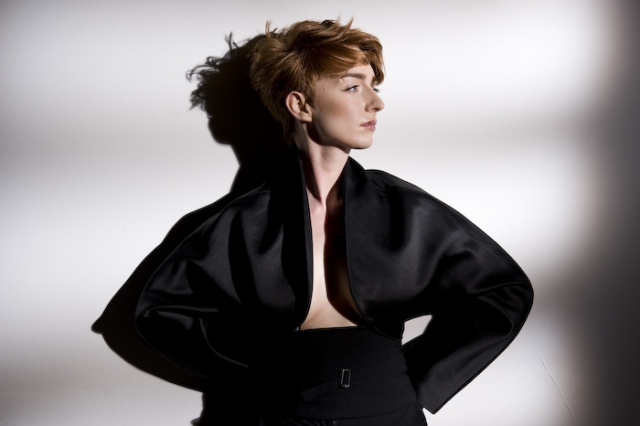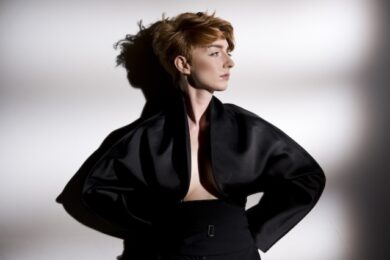There has been a haunting over here; in the car, in the flat, aloof with an iPod, wandering through urban sprawls. To date, the sound of 2010 has been dominated by LoneLady’s debut album on Warp, Nerve Up, omnipresent until interspersed with snatches of Deus and, bizarrely, a new Jimi Hendrix album.
But Nerve Up provided something different. It does, I admit, transport me straight back to days spent with early Ludus (1979, Manchester), when that peculiarly jagged and ill-fitting band seemed to strangely expand upon the already strange artwork of singer Linder Sterling. Back then, you see, Ludus – whether crammed in a Transit en route to supporting the Buzzcocks in Blackburn or at home in The Russell Club – were punching on a different level. You just had to think that this whole thing was glimpsing a different world.
All this is relevant because a number of reviews of Nerve Up (topped by Doran’s championing review in the NME) have immediately harked back to the Ludus of Linder, of Manchester ’79, if not later. Undoubtedly, there is more than a trace of Ludus contained within the elegant make-up of Nerve Up…but there is much more. In both artists, the sheer blinding light of intelligence is the first thing to hit. This is smart, clipped, bright and brave. But where Linder’s musical wanderings showed a weakening – it retained a cold, difficult, uncomfortable feel – LoneLady escapes. For there is an extraordinary and ironic intimacy on Nerve Up. It may well be down to the humility within the voice; it could be the courageous simplicity deployed here or it could, of course, be down to the exceptional care taken in the recording process.
With the album gaining momentum daily, LoneLady – real name Julie Campbell – is ensconced in rehearsals for a forthcoming tour. As such, tracking her down is rather like arranging to share a coffee with Madonna. Two weeks before we speak, and after a dizzying juggle of times and venues, I find myself hanging about in the darkened alley behind Manchester’s Ruby Lounge, huddled in the cold like a scene from Guy Peelheart’s Rock Dreams. It wasn’t a problem; if anything, the vacuum between agreeing and meeting only served to deepen the enigma.
When we finally speak, she is reservedly apologetic, which I like. And in an instant, the intelligence that dominates the album becomes wholly apparent. I am not convinced she is entirely comfortable with this promotional chat lark or, indeed, entirely sure of me. Nevertheless, she talks through interesting areas. At no point does it feel like PR. But edge or not, she MUST have enjoyed the largely positive reaction to Nerve Up?
"I wouldn’t have read any of the reviews at all," she says, "but Warp sent them to me and I felt that I should do. I don’t know if they are relevant to the music in any way, even the positive ones."
Like, I suggest, they are talking about someone else’s work?
"Yeah…exactly. I don’t really know how to respond to that. It’s not that I don’t respect them, or anything. But they are not really my concern…I don’t want to start thinking about them, about what their reaction might be. That would be a compromise."
Paul Morley suggested that you aren’t entirely comfortable with the idea of easing into public consciousness.
"That’s true," she mulls. "Everything Paul said about me was just about 100 percent bang on."
(Bastard! He’s been doing that to me for the past 30 years. Did it with Ludus, too. So no pressure here, then).
Julie was brought up not in Bohemian Didsbury or, as has been suggested, ‘trendy student-packed Hulme’, but rather unfashionable Audenshaw, hinged to the north east of Manchester. Even this detachment seemed peculiarly relevant; perhaps she soaked in Manchester’s legacy from that slight distance.
"I actually and deliberately avoided listening to Manchester music when I was growing up," she declares. "I am not even sure why. I didn’t want to belong to any of that…to anything."
As if the cliché’s might dog her growing musicality?
"Possibly, but then again, I wasn’t a musician nor did I have any real ambitions in that area. I mean, I liked music as much and anyone, but art always seemed to be my more natural leaning."
Indeed, art held sway to such an extent that Julie would eventually emerge with a Fine Arts Degree from Manchester Poly (Like Mick Hucknall, who grew up, 20 years earlier, in nearby Denton). Like the aforementioned Ludus, her music does seem to be an extension of that natural artistic muse. I wonder if Julie is aware of that connection.
"Obviously I knew that Linder is a fascinating person," she answers. "But I was more aware of her artwork and her sleeve designs for the Buzzcocks and all that than the music. I’m going to research her a bit more.
"As for the music being an extension of the art…or part of the same thing, I would agree. There’s more, too. While at college I was involved in a lot of creative writing and that was important…poems too. This was all part of the same thing and we had some success. It became a part of a magazine which did quite well in the student areas of Manchester area. It continued for about five years."

All of which hints at a careful approach to art, writing, music, emerging into the spotlight – and a sense of care, of detail, of getting things EXACTLY right, which is certainly a factor in the success of Nerve Up. There is little about the album that seems hasty, or preserving the rush of the moment. It is a collection of songs blessed with clinical perfection although not at the expense of heart. It is the courage to place artistic belief in apparent simplicity.
"It takes a lot of hard work to make something sound simple," she says.
"We worked and worked to get the sounds just right. Even to the extent that we avoided going into a conventional studio. I was fully aware of how easy it would be to just do that and finish up with something that sounded just like lots of other people. We found an old mill building in Ancoats. We were on a budget, but we set up the equipment in there and actually used the building as an instrument, as a way of finding different sounds. There was a very high ceiling and a lot of natural reverb. We even recorded in the corridors…ANYWHERE to try and get sounds.
"The atmosphere of the place…it was drab, it was quite miserable but I loved it and loved being there. It became a hugely important part of the album."
Ancoats, it might be worth reflecting, was the world’s first industrialised suburb. Once it was black, damp, teeming and thick with the pain of squalor. I am not suggesting that such a satanic history (curiously a source of endless pride for many of today’s Manchester movers and shakers) has had any direct affect on a 2010 album on Warp Records, but there remains a air of distance about Ancoats, separated, as it is, from the bars, galleries and hip emporiums of the Northern Quarter by Great Ancoats Street. However, one strongly senses that this physical separation is important to Julia (and even resonates in her LoneLady persona, if that’s what it is). Almost everything about her and her music seems to suggest ‘detachment’. Even her existence on the Warp roster seems slightly awkward and, as Morley noted, in a male dominated world.
I wonder if the music of Nerve Up seems distant even to her?
"Yes," she instantly replies. "It was recorded about a year ago and I have naturally moved on from that. But also because of the way it was recorded, I can’t really return there, certainly not in the sense of the sounds we found…the sounds we used. This was a problem for me in a way, because I’m about to go on tour and in preparation for what is, I suppose, promotion for the album, I knew I couldn’t recreate it in a live setting. I wasn’t even sure how to approach performing live. I had considered using a laptop but that just seemed too cold. So in the end I decided that it would be better to use a proper drummer…I just wanted a certain warmth and feel for the live format. So even in that sense, I have moved on from Nerve Up. Hopefully, playing live will thow up some interesting situations."
Interesting indeed. Interesting to see how Julie chooses to submerge deeper into public consciousness. Listening to her speak with a precocious intelligence wrapped in rounded Mancunian vowels (think more early Viv Westwood rather than the over-emphasised, grimly expressed ‘Manc’ of the irksome Gallaghers), it seems an awful long way from the ‘kookiness’ associated with emergent ‘female’ artists. One cannot envisage her stalking the Brits stage.
"I find it insulting to even be regarded as a ‘female’ artist," she refreshingly states.
"I don’t associate with those people at all. The way those girls conform to that…then again, they are having fun and getting somewhere, good luck to them."
“But I find them annoying and sometimes, whether watching the Brits…I just feel…I don’t know…why don’t they all just fuck off?"



